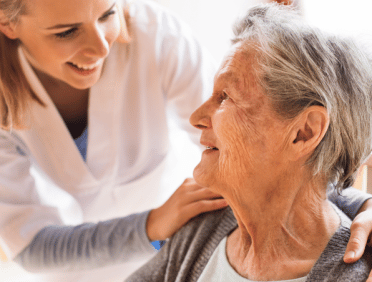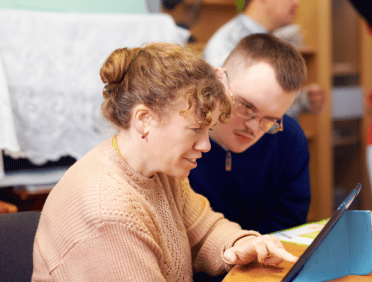What does “safeguarding” entail concerning vulnerable adults in the UK?
Every adult in the UK has a right to live safely and free from abuse or neglect. The majority of adults can ensure this happens for themselves, however, when it comes to vulnerable adults, they may not be able to manage or maintain their safety.
Safeguarding is a process and responsibility to ensure that adults who are unable to protect themselves, do not come to any harm and that any instances of abuse or neglect are stopped wherever they are possible to be.
Who holds the responsibility for safeguarding adults in the UK?
Whilst the local authority will be required to have a level of responsibility placed on them when it comes to safeguarding vulnerable adults, it is important to know that safeguarding, as a whole, is the responsibility of everyone.
What are the different types of abuse that are considered in the realm of adult safeguarding?
Abuse can come in a variety of forms. Sometimes abuse can be seen in just one form, however, there are also times when they may occur together, to one person. The main types of abuse that may be seen in the realm of adult safeguarding include physical abuse, financial abuse, psychological abuse, emotional abuse and sexual abuse.
How can one identify signs of abuse or neglect in vulnerable adults?
No two people can show signs of abuse in the same way, however, some common signs could show that someone is a victim of abuse.
These include:
- Poor hygiene
- Lack of essentials including food, shelter and clothing
- Dehydration or malnutrition
- Poor or unsanitary living conditions
- Neglect of household maintenance
- Hoarding of items or animals
- Bruises and marks
- Lack of confidence or change in behaviours, particularly around certain people
What actions should be taken if there are concerns about the potential abuse or neglect of an adult?
The actions that should be taken when it comes to a potential abuse or neglect situation is to ensure that you highlight any concerns that you have to someone who can ensure that the right help is obtained. This may be the GP that is assigned to the adult, or perhaps, a social worker.
The adult may already have a social worker assigned to them, which means that you should contact them. However, if they do not, then you will need to speak to the relevant local authority and ask them to send out a social worker to check on their well-being and ensure that they are safe.
Of course, if you have any concerns for the immediate safety of the adult, or think that they are at a great risk of harm, then you should speak to the police and ask for their support in the situation.
What laws and policies are in place to protect vulnerable adults from abuse in the UK?
The main way that vulnerable adults are protected in the UK is with The Care Act 2014. This act was set out to provide a clear legal framework which identifies how Local Authorities should be working with the other parts of the care system to protect those adults who are most at risk from abuse or neglect.
What is the role of social services in safeguarding vulnerable adults, and how do they collaborate with other agencies?
Social services are there to safeguard vulnerable adults. They work in a way that ensures that those adults are protected and that any instances of abuse or neglect towards them are prevented.
To best do this, they need to collaborate and work with other agencies, doing this means that they are going to have a rounded view of what may be happening to, or around the adult and have all the information that will be required to ensure that they are protected and kept safe from harm.
How does the process of safeguarding adults differ from that of safeguarding children?
The main idea of safeguarding, no matter who it is for, is to protect the person who is at risk of harm. This is the same for adults and children alike. However, when it comes to adults, there is an adult’s right to self-determination.
Adults, even when it comes to safeguarding have a right to make their own choices, and it is only when the case is particularly severe, that the law will able to override this right. This is not something that happens when children are being safeguarded.
What support services are available for adults who have experienced abuse or neglect?
Being a victim of either abuse or neglect can have a huge impact on someone and leave them feeling alone in the world. This is why it is vitally important that there are a variety of support systems that are available for these people to help them not only in the present but the future too.
Some of the main support services that are out there for adults to contact include:
- Hub of Hope
- Samaritans
- Victim Support
- HAVOCA
- NAPAC
How can one make an anonymous report about suspected abuse or neglect of an adult?
Any reports that are made about the neglect and abuse of an adult can be made anonymously. Depending on the severity of the case, either the Local Authority can be called to report or to speak to the police about the situation.
What measures can communities take to prevent the abuse and neglect of vulnerable adults?
When it comes to helping vulnerable adults, it is important that all of those people around them, the community, take an active role in ensuring that they are protected as much as possible.
The main thing that communities can do is to remain aware and alert. That way, they can be sure to discover possible cases of either abuse or neglect and be able to offer support to the adult concerned. They are going to be best placed to be there on a day-to-day basis and they can often be the lifeline that the adult needs to help them to recover from what they have been through, as well as identify what has happened to them as a form of abuse.
What training opportunities exist for individuals interested in learning more about safeguarding adults?
Safeguarding adult training will often be provided to those in the Local Authority, or who are working within the care system. However, any adult can find out more about the aspects of safeguarding and what they can do to ensure that it happens.
There are a range of informative articles out there that can be used to learn more about safeguarding, as well as training courses that are there to ensure that the basics are covered to help protect those in the community who need the most support.
Are there any legal repercussions for those found guilty of abusing or neglecting vulnerable adults in the UK?
The answer to this is always yes. If someone is found guilty of either abusing or neglecting a vulnerable adult in the UK, then there is likely to be some form of legal repercussion that they will need to face.
The severity of the punishment for this will depend on the severity of the case and will be decided, much like any other crime, in the court system.
How does the Mental Capacity Act influence the safeguarding of vulnerable adults?
The Mental Capacity Act 2005 is there to ensure that everyone has the power to make decisions for themselves, where they can do so. Not only this but for those who may not have the capacity to make their own decisions, there is also a flexible framework that is designed to ensure that they can remain at the heart of these decisions and how they are made.
How does the concept of dignity and respect factor into the safeguarding process for adults?
Every person, no matter who they are, or where they are living, has the right to be treated in a way that maintains their dignity and in a way that is respectful towards them. They should feel safe in where they live and also their interactions with those who are there to help and support them.
Not only this, but they should be treated in a way that ensures that they feel that they are empowered to make their own choices, wherever this is possible.
How do healthcare professionals contribute to the identification and prevention of abuse or neglect of vulnerable adults?
Healthcare professionals are there to ensure that they can pick up on the possible cases of abuse and neglect that can occur with vulnerable adults. They will be able to identify the changes to the person and their environment, and if this is not known (perhaps because the person is only just entering the care system) they will be able to identify what the “norm” for adults should be.
They also can understand how to properly question the adult, in a way that allows for all the facts to be obtained.
In what ways does the safeguarding process consider the participation and wishes of the adult being safeguarded?
No matter the individual needs of the person who is being safeguarded, they should always feel that their own wishes and thoughts are a part of the process. They should be able to express how they feel and they should, where possible, be encouraged to make their own decisions that relate to them and their care.
Of course, there may be situations, whereby it is best to ensure that they can weigh up a variety of options, allowing them to come to their own decision.
How does the safeguarding approach differ for adults with disabilities or mental health concerns?
Even if an adult has mental health concerns or a disability, the aim should always be to ensure that they are an active part in the decision-making of their safeguarding. That said, if it is deemed that they are unable to help in this decision-making process, or that they may put themselves at risk of harm, then, the final say in decisions may be taken out of their control, although, still ensuring that they are playing an active role and that they are aware of what is happening to them and what will happen in the future.
What are the main obstacles to achieving effective safeguarding for vulnerable adults in the UK?
Several barriers and obstacles can have an impact on the effective safeguarding of adults who are identified as being vulnerable.
One is a lack of training and awareness amongst those who are caregivers. Seeing as the role that they play in safeguarding is so key, if they are simply not aware of the main aspects of this process, then it will be likely to fail at the first hurdle. Particularly if this concerns the signs that they should be looking out for when it comes to abuse or neglect.
Another possible barrier is the adult themselves, they may want to make decisions that could end up being harmful to them and this can go against the idea that they should be empowered to make their own decisions. This can be a hard balancing act to achieve, however, with careful time and effort, it can be done.
Finally, another barrier is the concept of a multi-agency approach. Whilst it does work because it gives a rounded view of the person and what is happening to them, if one agency does not interact well, or the communication across the board is not up to standard, then there is a risk that the entire thing can collapse and the person will no longer be as safe and protected as they may have otherwise been.
How can individuals and communities contribute to establishing a secure environment for vulnerable adults in their localities?
The main way that both communities and the individuals that make up the community can be involved, is simply by being aware of what may be happening to people in their local area. Simply staying aware and ensuring that you get to know those who are most vulnerable, can sometimes be the main difference between these cases that lead to safeguarding processes, being missed and being picked up on.
Safeguarding Training
- Learn Q’s Safeguarding Children Level 1 is an introductory course that provides a basic understanding of safeguarding vulnerable children. It covers the concept of safeguarding, the importance of safeguarding, the legislation in place to protect vulnerable children, the signs of abuse and how to avoid them, and how to respond when a vulnerable child discloses they are being abused or neglected. This course is suitable for anyone who works with vulnerable children, including managers, supervisors, employees, and volunteers at all levels.
- Learn Q’s Safeguarding Children Level 2 course, on the other hand, is a more advanced course that builds on the knowledge gained in Level 1. It provides a more in-depth understanding of safeguarding, including recognising abuse, the responsibilities of different safeguarding roles, effective communication, and how to handle concerns and incidents related to safeguarding. This course is designed for those with additional safeguarding responsibilities, such as those who work in hospitals, general practices, nursing homes, care homes, or domiciliary care, as well as in religious organisations and community organisations.
- The Safeguarding Adults Level 1 course (£25) offered by Learn Q in the UK covers several key areas crucial for the protection of vulnerable adults. Participants will learn about the concept of safeguarding vulnerable adults, the importance of safeguarding, relevant legislation, recognising signs of abuse, responding to disclosures of abuse or neglect, and reporting safeguarding concerns while maintaining confidentiality.
- The Safeguarding Adults Level 2 course (£28) at Learn Q is designed for individuals with additional safeguarding responsibilities, particularly those working in settings like hospitals, general practices, nursing homes, care homes, domiciliary care, religious organisations, and community organisations. It is ideal for seasoned team members who have already completed introductory Level 1 training. The course content includes understanding the concept of safeguarding vulnerable adults, the importance of safeguarding, relevant legislation, signs of abuse, responding to abuse or neglect disclosures, reporting safeguarding concerns, maintaining confidentiality, understanding workplace safeguarding roles and responsibilities, multi-agency working, and effective communication skills
- Learn Q’s Preventing Radicalisation course is designed to help frontline sectors to be aware of how to prevent radicalism and extremism. Especially for individuals who have contact with adults who may be vulnerable. It raises awareness of the signs and techniques of radicalisation so that you can provide support and guidance to individuals in need as well as save their lives if you can identify these signs.
You can get further savings by purchasing one of Learn Qs money saving bundles, such as:
These courses are ideal for those who work in hospitals, general practices, nursing homes, care homes, domiciliary care, as well as in religious and community organisations. By completing this course, you will be better equipped to handle safeguarding concerns and to ensure the safety and well-being of vulnerable adults.
At Learn Q, we are committed to providing high-quality training that meets the needs of professionals across a range of industries. Our Safeguarding Children courses are designed to provide you with the knowledge and skills you need to excel in your role and make a real difference in the lives of vulnerable children. Sign up today and take the next step in your career!












